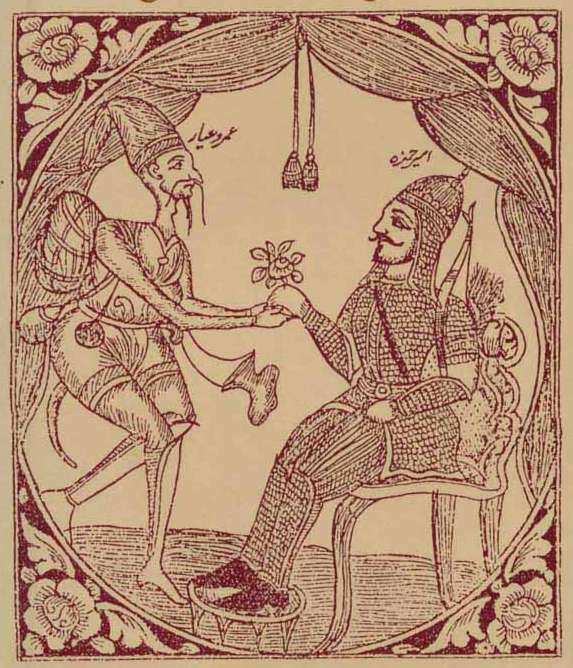FWP:
ABOUT the omission of to : In this verse there's an invisible but necessary 'if' before the first line, and an invisible but necessary 'then' before the second line. The same grammatical structure appears in the next verse, {22,8}, as well. I can't recall seeing any other examples in which both the 'if' and the 'then' have been colloquially omitted. But it's relatively common in an 'if, then' sentence for the 'if' to be colloquially omitted, so that the structure becomes 'clause A, to clause B'; here are a few examples: {57,3};
{59,8}; {62,1}; {62,4}; {62,5}; {62,10}; {125,3}. If the omitted word is not supplied, then in every case that I've ever seen, the result will be a mistranslation. Keep in mind however that to is extremely versatile; when it appears in other configurations, it can work quite differently. On this see {193,1}.
Hamzah's adventures center on what is usually referred to in Persian and Urdu as razm-o-bazm . razm is easy to translate: it means battles and warfare. For bazm we have no exact English synonym: it means something like gracious courtly life, evening parties with women, elegant social gatherings suitable for romance. (The other main Urdu dastan topics are :tilism , 'enchantments', and ((ayyaarii , a sort of guerrilla warfare.)
This verse seems to tell us that storytelling is fun, passion is not fun. If you enjoy even hearing about it, it's a story, not the Real Thing. You'll know the real thing when you hear it, because blood will be dripping from every pore. Of whose body? The narrator's? The listener's? Both? And why will the blood drip? Admiration for gallant and chivalrous behavior? Sympathy at such suffering? Horror at the beloved's cruelty? Vicarious passion? These are real questions, but compared to the usual depth and range of Ghalibian unanswered questions, they're small ones.
To my mind, the interest of this verse lies in the suggestion that it is actually offering a litmus test. How can you tell a story of real passion from the Hamzah romance (or a generalized story of the 'Hamzah romance' kind)? From this verse it seems that in principle you almost can't. You can only tell pragmatically, experientially-- and not exactly after the fact, but certainly no sooner than during the fact. (Notice the verb tenses-- subjunctive in the first line, as befits a proposed test, and perfect in the second, as befits a retrospective judgment of a completed action.)
This suggests that passion too is a story of razm-o-bazm , war and (courtly) love, with many of the same elements that appear in romances like that of Hamzah. Except that in this case the lover's passion is real, and packs such a punch that the teller and hearer too somehow share in the bloodshed. It's not the excellence of the storyteller that makes the difference-- the blood flows dam-e ;zikr , at the very moment of telling, with the very breath of mentioning. There is some kind of mystical participation here, it seems. It is not the visible iceberg that cuts you to pieces, but the much larger underwater part-- the part you can't see.
The following verse, {22,8}, continues the same line of thought, and thus is helpful in suggesting interpretations for this one.
For more on the wordplay involving dam , see {1,3}.

Nazm:
That is, it's not possible that pure blood wouldn't drip. In this verse is the negative [rhetorical] question [istifihaam-e inkaarii]: can it at all be possible that pure blood would not drip? (24)
== Nazm page 24